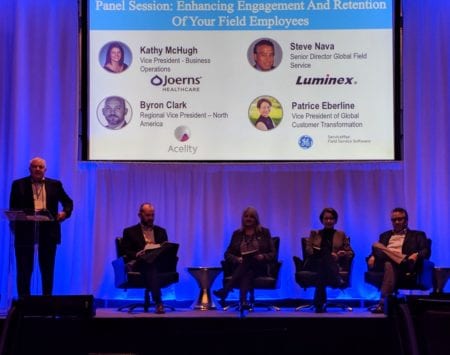Last week at the Field Service Medical Conference in sunny San Diego, I attended a panel session “Enhancing Engagement and Retention of Field Service Employees.” Field service leaders from Acelity, Joerns Healthcare, Luminex Corp., and our own Patrice Eberline discussed how to successfully address generational challenges at work, such as the retiring baby boomer generation, also referred to by some researchers and analysts as the “silver tsunami.”
This is a huge topic for the industry that is in the midst of a generational transition. Indeed, The Service Council reports that 70 percent of service companies will face a technician deficit from retirement in the next decade. While the older generation is already starting to retire, hiring new employees is a challenge, partially because the current unemployment rate is so low, making it hard to attract talent.
This transition to a new workforce is not an easy one. There are questions about retaining and sharing knowledge, keeping customers happy, building relationships of trust and respect with the employees. Some of these can be solved with technology. For example, a digital field service tool can help keep and share the knowledge of more experienced workers, enforce service processes to be followed in the field by technicians, and help with the know-how through interactive knowledge bases, expert chats, and even augmented reality.

But most of what the panel focused on was how to build relationships of respect with their current and incoming workers. Here are some of the successful strategies that the panelists discussed:
Build Personal Relationships With all of Your Employees
Instead of only relying on technology to communicate. Meet your field service team in person, invite them and their families out to dinner, and more. This way, when you ask your technician to take on additional projects, you’ll have the support of the whole family. In addition, develop good enough relationships to ask what the root cause of their unhappiness is. More often than not, it is something that can be managed so the employee doesn’t leave and actually becomes more engaged.
Find Ways to Keep Your Older Employees and Share Their Knowledge
As your current employees get older and cannot drive, or lift, or put in the same number of hours as they used to—they can still have major contributions to field service organizations. Put these people with decades of experience in headquarters, or as remote workers who can become mentors to incoming employees, or to troubleshoot issues remotely.
Listen to (and Work With) the Values of the Incoming Workers
Millennials prize independence and flexibility. Field service organizations are working on models to provide more flexibility around how and when technicians can get their work done. (Digital tools can help here to complete work independently as well as self-dispatch to do more work in the same geographic area.) At the end of the day, people work hard and feel passionate if they feel they are doing important work and their other incentives align. Make your employees feel valued and heard.
Create Growth Opportunities
According to research from The Service Council, one-third of field service technicians don’t think there are adequate growth opportunities. Even when it seems hard to do in the field service environment, the panelists pointed out creative ways to approach career growth. In certain cases, it may seem that the roles don’t grow over time. But it is possible to create mentorship types of relationships accompanied by stipends, so that people feel there’s growth and progress. I also think there are opportunities to differentiate with bands or certifications so that technicians that can work through more complex equipment receive better pay or other benefits. Many companies also incentivize their employees on performance, NPS, and upsells.
In the end of the day, even for those lone wolves in the field, they are all part of larger organizations working together to achieve common goals. No matter if they have 30 years of experience or 30 days in the field, people expect their managers to treat them with respect and look out for their best interest. Technology is certainly available to help with productivity, knowledge transfer, and flexibility. However, it is really the personal relationships that still matter most to technicians who make a choice to enter and grow with field service.
For more information about ServiceMax, please visit www.servicemax.com


Share this: